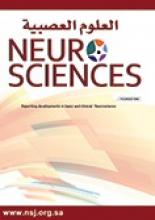Abstract
OBJECTIVE: To assess and compare, prospectively, schizophrenia relapse in relation to neuroleptic medication in long term maintenance therapy.
METHODS: All schizophrenic patients who met the DSM-IV criteria attending King Khalid University Hospital psychiatry outpatient clinic, Riyadh, Kingdom of Saudi Arabia in January 1994, and who fulfilled the inclusion criteria of the study, were assessed at baseline using the brief psychiatric rating scale (BPRS), quality of life scale and the extrapyramidal rating scale, and at each relapse and 6 weeks after treatment of the relapse and followed for 10 years after being allocated to one of 3 groups of neuroleptic medications depot (group A), conventional (group B) and atypical, clozapine (group C). A data collection form including sociodemographic data and other clinical indices was also completed for the patients.
RESULTS: Seventy-six schizophrenic patients met the DSM-IV diagnostic criteria, but only 59 patients fulfilled the inclusion criteria of the study and 4 patients quit the study. The mean age was 27.45 years and 63.6% were males and 98.2% were Saudis. There was a statistical significance of the BPRS scores before and after relapse for groups A and C, but not for group B. The relapse rates at one year, 2 years, 3 years, and 5 years were in the range 13.3-34.6% for groups A and C but much higher at 35.7-85.7% for group B.
CONCLUSION: Relapse rate in schizophrenia can be markedly reduced by effective maintenance neuroleptic treatments adhered to by the psychiatrist leaving more room for further reduction of relapse by implementing other measures such as lowering the expressed emotion, psychoeducation and rehabilitation. Further long-term large sample research is needed to affirm this.
- Copyright: © Neurosciences
Neurosciences is an Open Access journal and articles published are distributed under the terms of the Creative Commons Attribution-NonCommercial License (CC BY-NC). Readers may copy, distribute, and display the work for non-commercial purposes with the proper citation of the original work.






